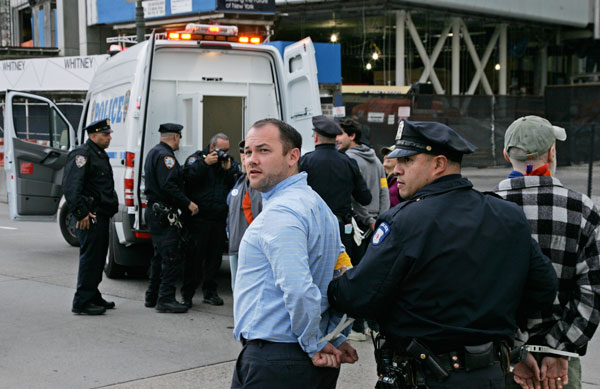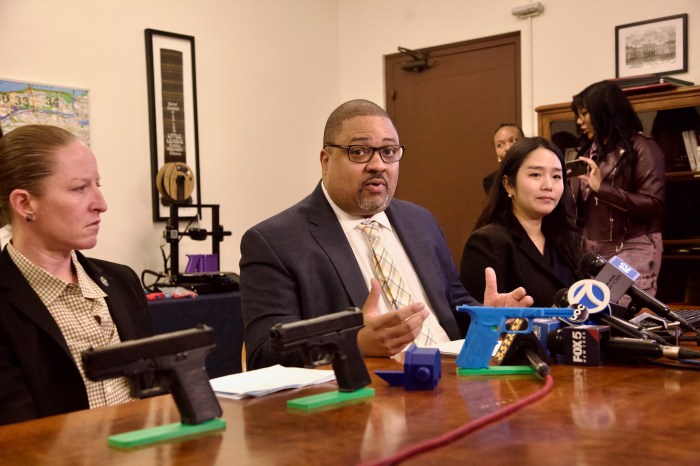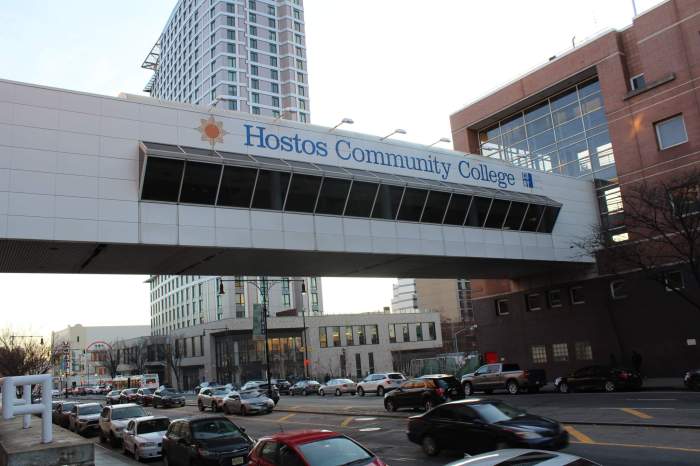
BY SAM SPOKONY | A day after the underground Spectra pipeline began pumping natural gas into Manhattan’s Lower West Side, around 150 residents, environmental activists and elected officials gathered at the site of the pipeline on Nov. 2 to continue their protests against what they consider to be its dangerous impact on the neighborhood.
Thirteen people were arrested after they unfurled a banner reading “Shut Down This Pipeline” across West St. near Gansevoort St., and blocked traffic for several minutes around 4 p.m.
Among those arrested was City Councilmember-elect Corey Johnson — who would win election three days later — and his chief of staff, RJ Jordan.
In his position as Community Board 4 chairperson — which he will vacate upon taking office in January — Johnson has frequently spoken out against the pipeline, especially because he and many others have stated that it was installed without the approval or feedback of any local community groups.
“Hopefully, we can draw a line in the sand here, because this is not the only pipeline they’re going to try to lay,” said Johnson, in an interview before the protest, which was also led by the activist groups Occupy the Pipeline and Sane Energy. “They’re going to try to lay pipeline after pipeline, with fracked gas, with high concentrations of radon, and the public needs to know about this.”
The pipeline transports roughly 800 million cubic feet of natural gas per day, according to the Spectra Energy Corporation, whose headquarters are based in Houston, Tex. A spokesperson for the company said that gas flowing through the pipeline will come from wells in the Appalachian Basin in Pennsylvania, the Rocky Mountains, the Gulf of Mexico and off the coast of Nova Scotia in Canada.
In a statement released Nov. 1, the day the pipeline became active, Spectra C.E.O. Greg Ebel said that successfully completing the pipeline was “a testament to our ability to secure, permit and execute on large and complex growth projects.”
In the same release, Bill Yardley, Spectra’s President of U.S. transmission and storage, claimed that people in New York and New Jersey could save $700 million in energy costs per year as a result of replacing fuel oil with the pipeline’s domestically produced natural gas. The use of the pipeline’s gas will also eliminate about 6 million tons of carbon dioxide emissions per year, according to Spectra’s estimates.
“We’ve invested the past five years speaking with stakeholders and officials, planning and re-planning, designing and constructing this pipeline, all to ensure it was completed safely, efficiently and to the highest standards,” said Yardley.
But many residents in the West Village and Chelsea remain unconvinced about the safety of living above the hub for hydrofracked gas, which is believed by many to contain unsafe quantities of the dangerous chemical radon.
“A big problem for us is that the gas is also coming through the Con Edison pipes, and frankly, Con Ed doesn’t have a very good record of maintaining its infrastructure,” said Bill Borock, president of the Council of Chelsea Block Associations, at the Nov. 2 protest. “So, in addition to the main problem of whatever toxic chemicals are coming into our homes through the gas, we have the problem of what happens if something goes wrong with the pipeline.”
Borock alluded to the disastrous breakdowns in Con Ed’s plants and supply lines during Hurricane Sandy last year, and said he fears the potentially catastrophic result another Sandy-like storm could have on the gas lines.
Other elected officials at the protest included Councilmember Gale Brewer, who was elected Manhattan borough president on Tuesday, and Assemblymembers Richard Gottfried and Linda Rosenthal.
Rosenthal is the sponsor of a bill that would require utility companies across the state to monitor and mitigate radon levels before natural gas is delivered to consumers. The bill was introduced in April, but has not yet reached the Assembly floor for a vote.
Before Johnson prepared to block the street and get handcuffed on Nov. 2, he mentioned a conversation he had that morning with Bill de Blasio, now the city’s mayor-elect, who has had his own experiences with civil disobedience.
“I told [de Blasio] I was going to get arrested today, and he just told me, ‘Be patient, because it can take a while,’ ” said Johnson.
Johnson and the dozen other people arrested at the protest were all charged with a violation for disorderly conduct, and spent several hours in a holding cell before being released, according to the Sixth Precinct.
Johnson said that he has not yet had a “substantive conversation” with de Blasio about the Spectra pipeline, but added that he feels confident that “with a Mayor de Blasio we’ll have someone who actually wants to listen to community concerns on issues like this.”

















